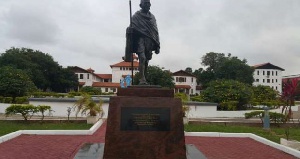 Mahatma Gandhi statue. File photo.
Mahatma Gandhi statue. File photo.
I have been studiously following the controversy and heated debate swirling around the erection and/or installing of the life-size statue of India’s independence movement icon and legendary civil rights spearhead Mahatma Mohandas Gandhi with keen interest (See “Government to Relocate Gandhi Statue from the University of Ghana” Citifmonline.com / Ghanaweb.com 10/5/16).
But until now, I have avoided making any critical comments on the impasse, one way or another, until I finally felt certain about the real issues involved in both the controversy and the debate. As a scholar, academic, historian and a journalist, I have read quite considerably about the writings, philosophy and remarkable life of the Indian icon who, like the great African-American civil rights legend, Dr. Martin Luther King, Jr., was assassinated by one of his own countrymen. Perhaps by one who was deeply agitated by the fame and global stature of the man and the far-reaching implications these had for the future of ethnic, religious and political relations on the subcontinent.
Nevertheless, what really inspired this piece was the knowledge that contrary to what had been put out into the public domain and the media earlier on, that it was the recently retired Vice-Chancellor of the University of Ghana, Prof. Ernest Aryeetey, who led efforts to have the Gandhi statue installed on the main Legon campus of the country’s flagship academy. Now we learn that it was actually the Nkrumah-leaning and Mahama-led National Democratic Congress (NDC), acting through the country’s Foreign Minister, Ms. Hanna Tetteh, that authorized the installation of the Gandhi statue.
If this observation or knowledge turns out to contain any iota of truth or validity, then it definitely constitutes adequate grounds for the democratic removal of President John Dramani Mahama and his cronies. For even a casual perusal of the foundational history of the University of Ghana indisputably indicates that the coming into being, or existence, of Legon, as the University of Ghana is popularly known, was the singular yeomanly handicraft and brainchild of Dr. Joseph (Kwame Kyeretwie) Boakye Danquah, the putative Doyen of Gold Coast and Modern Ghanaian Politics.
In sum, the de facto founder of the University of Ghana is our country’s acclaimed greatest “Afrocentric” philosopher of the twentieth century. And so the question that Ghanaian scholars, intellectuals, students and even ordinary citizens ought to be asking themselves is why, to-date, there is absolutely not even a single brick or pebble on the Legon campus of the University of Ghana that bears the name of the man whose vehement agitation and anticolonial writings and arguments, both inside and outside the country’s legislature, auspiciously culminated in the establishment of Legon at the time that it did.
Prof. Robert Addo-Fening, emeritus of the Department of History at the University of Ghana, has already eloquently observed this fact; and so I do not intend to belabor the same point and subject here. And for this undeserved obloquy against Danquah, the leading players in the Gandhi controversy ought to feel deeply ashamed of themselves, that is, if they know and appreciate the full meaning of what the word “conscience” and even happen to be endowed with a remarkable modicum of the same.
At any rate, predicating the significance of Gandhi’s whole life’s work and reputation on the ultra-nationalist phase of his career, that is pre-1930s, does great injustice to this twentieth-century human- and civil-rights icon who considerably influenced and continues to influence more global African leaders than any other major African leader, including Ghana’s own President Kwame Nkrumah, another prime political and philosophical protégé of Mahatma Gandhi.
Other African leaders who have been significantly influenced by the writings and teachings of the legendary Indian icon are President Nelson Mandela, Archbishop Desmond Tutu, Dr. Martin Luther King, Jr., and Bayard Rustin. And so in a very practical sense of the term, Mahatma Gandhi was truly a giant among global political and human- and civil-rights giants.
But, of course, the preceding observation does not place the great Indian lawyer and scholar beyond the realm of the purely human and fallible. Indeed, legend has it that Gandhi had been nominated at least five times and shortlisted three times for the Nobel Peace Prize by the Swedish Academy, but was never conferred with this globally prestigious honor because Nobel Committee adviser Jacob Worm-Muller had not been impressed with Gandhi’s ultra-nationalist struggle for the improvement in the quality of the living standards of the Indian residents of South Africa, to the total exclusion of indigenous South Africans the majority of whom lived under even more repressive and horrible conditions than Indian South Africans (See “Why Didn’t Mahatma Gandhi Ever Get the Nobel Prize?” Wall Street Journal 10/10/14).
But, of course, the preceding knowledge, in of itself, ought not to be used to render Gandhi a pariah on the campus of the University of Ghana, for Gandhi’s significance and influence are acclaimed worldwide. Likewise, contrary to the warped logic of Ms. Tetteh, Ghana’s Foreign Minister, Gandhi’s stature cannot be superficially predicated on the land size and population of India. As well, the decision of whether to remove or maintain the Gandhi statue on the campus of the University of Ghana ought not to be predicated on the possible fallout in diplomatic relations between Ghana and Indian.
For there are Danquah-hating characters on the campus of the University of Ghana who, based on the blighted logic of anti-Gandhi faculty members like Professors Akosua Adomako Ampofo and Obadele Kambon, ought not to be teaching at Legon.
*Visit my blog at: kwameokoampaahoofe.wordpress.com Ghanaffairs
Kwame Okoampa-Ahoofe, Jr., Ph.D.
English Department, SUNY-Nassau
Garden City, New York
October 14, 2016
E-mail: okoampaahoofe@optimum.net